
Drexel Hill (484) 521-0233
West Chester (610) 436-5883

Drexel Hill (484) 521-0233
West Chester (610) 436-5883
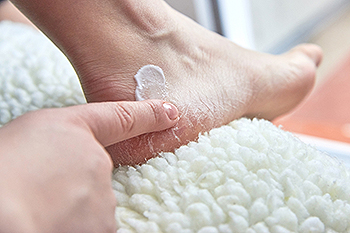
Cracked heels can develop into fissures that become both painful and potentially dangerous. A fissure is a deep crack in the skin of the heel, usually caused by a lack of moisturization. Some conditions can contribute to the formation of heel fissures, including living in a dry climate, frequently wearing open-backed shoes, walking barefoot, and being overweight. Certain underlying medical problems, such as diabetes and hypothyroidism, also may be causes of heel fissures. Because open crevices in the skin can invite bacterial infection, it is essential to deal with heel fissures as soon as possible. Applying good-quality moisture creams or lotions several times a day and covering the feet with socks can speed up the healing process. People with diabetes, poor circulation, or auto-immune deficiency would be wise to consult a podiatrist for help with eliminating heel fissures in a safe and timely fashion.
If the skin on your feet starts to crack, you may want to see a podiatrist to find treatment. If you have any concerns, contact the podiatrists from Dr. Siegerman & Associates. Our doctors can provide the care you need to keep you pain-free and on your feet.
Cracked Heels
It is important to moisturize your cracked heels in order to prevent pain, bleeding, and infection. The reason cracked heels form is because the skin on the foot is too dry to support the immense pressure placed on them. When the foot expands, the dry skin on the foot begins to split.
Ways to Help Heal Them
Ways to Prevent Cracked Heels
If you are unsure how to proceed in treating cracked heels, seek guidance from a podiatrist. Your doctor will help you with any questions or information you may need.
If you have any questions, please feel free to contact one of our offices located in Drexel Hill and West Chester, PA . We offer the newest diagnostic and treatment technologies for all your foot care needs.
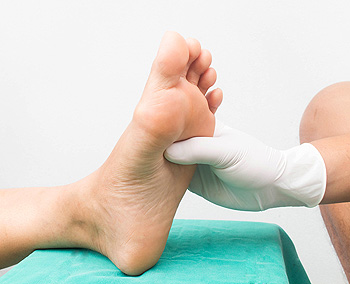
Recent studies have shown that approximately 10 percent of the American population has diabetes. Many of these are seniors, and other health issues may arise from the disease. Diabetic patients need their feet to be looked after and cared for daily, and this can begin by examining the bottom of the feet using a mirror. A family member or health care provider may be able to accomplish this exam, which is effective in noticing existing cuts, bruises, or scrapes that are on the feet. A common condition that diabetic patients can develop is a foot ulcer, and this happens when a cut is unnoticed as a result of neuropathy. This is the inability to feel sensations on the feet, which may cause a small cut to become infected, and often requires prompt medical treatment. An open sore may require an X-ray to be performed, to observe if it has spread to the bone. Washing and drying the feet in addition to cutting the toenails properly are part of good diabetic foot care habits. If you would like more information about diabetic foot care tips, please consult a podiatrist who can help you to manage this condition.
Diabetic foot care is important in preventing foot ailments such as ulcers. If you are suffering from diabetes or have any other concerns about your feet, contact the podiatrists from Dr. Siegerman & Associates. Our doctors can provide the care you need to keep you pain-free and on your feet.
Diabetic Foot Care
Diabetes affects millions of people every year. The condition can damage blood vessels in many parts of the body, especially the feet. Because of this, taking care of your feet is essential if you have diabetes, and having a podiatrist help monitor your foot health is highly recommended.
The Importance of Caring for Your Feet
Patients with diabetes should have their doctor monitor their blood levels, as blood sugar levels play such a huge role in diabetic care. Monitoring these levels on a regular basis is highly advised.
It is always best to inform your healthcare professional of any concerns you may have regarding your feet, especially for diabetic patients. Early treatment and routine foot examinations are keys to maintaining proper health, especially because severe complications can arise if proper treatment is not applied.
If you have any questions please feel free to contact one of our offices located in Drexel Hill and West Chester, PA . We offer the newest diagnostic and treatment technologies for all your foot and ankle needs.
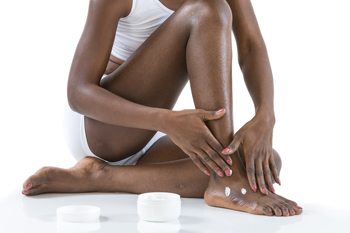
Taking care of the feet on a daily basis is a key part of maintaining your overall health. One of the most important ways in which an individual can care for and pamper their feet is by keeping them sufficiently moisturized. Keeping the feet moisturized protects against dry and cracked skin that might lead to conditions such as cracked heels. People may choose to apply a wide range of different moisturizers to their feet. Using moisturizing products like a glaze for the heel can help ensure that your skin on the feet feel smooth to the touch. Glazes or moisturizers may contain honey, aloe, and other moisturizing ingredients. While not all moisturizers may help you successfully get rid of calluses immediately, moisturizing the feet can nonetheless be helpful and beneficial. If you are someone that wants to take care of your feet, contact a podiatrist today about moisturizing the feet.
Proper foot care is something many older adults forget to consider. If you have any concerns about your feet and ankles, contact the podiatrists from Dr. Siegerman & Associates. Our doctors can provide the care you need to keep you pain-free and on your feet.
The Elderly and Their Feet
As we age we start to notice many changes in our body, but the elder population may not notice them right away. Medical conditions may prevent the elderly to take notice of their foot health right away. Poor vision is a lead contributor to not taking action for the elderly.
Common Conditions
Susceptible Infections
Diabetes and poor circulation can cause general loss of sensitivity over the years, turning a simple cut into a serious issue.
If you have any questions please feel free to contact one of our offices located in Drexel Hill and West Chester, PA . We offer the newest diagnostic and treatment technologies for all your foot and ankle needs.
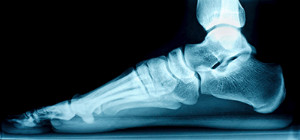
Having flat feet is a foot condition that affects groups of people from all walks of life. The majority of babies are born having little or no arch, and will generally normalize during the teenage years. Adults who retain this condition may have a genetic predisposition and may find relief in wearing custom-made orthotics. Flat feet is an ailment that is obvious. It is evident while standing on the floor, and noticing the foot lies completely flat. Some people have specific symptoms from this, including calf and shin pain, possibly limiting the type of activities that are pursued. Conversely, many people have no pain with flat feet but may realize their feet and legs can tire easily. If you have flat feet, it is strongly advised that you are under the care of a podiatrist who can regularly monitor this condition, and offer you correct relief options, if applicable.
Flatfoot is a condition many people suffer from. If you have flat feet, contact the podiatrists from Dr. Siegerman & Associates. Our doctors will treat your foot and ankle needs.
What Are Flat Feet?
Flatfoot is a condition in which the arch of the foot is depressed and the sole of the foot is almost completely in contact with the ground. About 20-30% of the population generally has flat feet because their arches never formed during growth.
Conditions & Problems:
Having flat feet makes it difficult to run or walk because of the stress placed on the ankles.
Alignment – The general alignment of your legs can be disrupted, because the ankles move inward which can cause major discomfort.
Knees – If you have complications with your knees, flat feet can be a contributor to arthritis in that area.
Symptoms
Treatment
If you are experiencing pain and stress on the foot you may weaken the posterior tibial tendon, which runs around the inside of the ankle.
If you have any questions please feel free to contact one of our offices located in Drexel Hill and West Chester, PA . We offer the newest diagnostic and treatment technologies for all your foot and ankle needs.
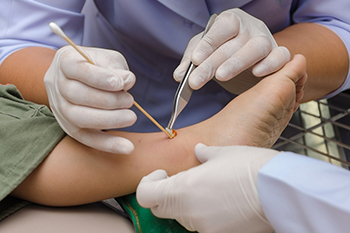
Wounds on the feet can develop for any number of different reasons. Commonly, if an individual is walking barefoot and steps on an irregular, sharp, or small object, this may create some kind of wound. Relatedly, foot wounds are common to some diabetics because the loss of feeling in the feet among diabetics makes it more difficult to even notice wounds when they develop. Although wound care is particular to each patient, several general rules of thumb might be useful. Generally, it might be a good idea to clean the wound before dressing it. If a medical professional says that it is permissible to do so, clean the wound with soap and water to fight against infections. It is also important to remember that the wound can also sometimes be dried with a towel so that it is not wet. Having a wet wound that makes the bandage wet might have a host of complications. If you are prone to developing foot wounds (perhaps because you suffer from diabetes or because you frequently walk around barefoot), contact a podiatrist today to see what you can do to ward off foot wounds.
Wound care is an important part in dealing with diabetes. If you have diabetes and a foot wound or would like more information about wound care for diabetics, consult with the podiatrists from Dr. Siegerman & Associates. Our doctors will assess your condition and provide you with quality foot and ankle treatment.
What Is Wound Care?
Wound care is the practice of taking proper care of a wound. This can range from the smallest to the largest of wounds. While everyone can benefit from proper wound care, it is much more important for diabetics. Diabetics often suffer from poor blood circulation which causes wounds to heal much slower than they would in a non-diabetic.
What Is the Importance of Wound Care?
While it may not seem apparent with small ulcers on the foot, for diabetics, any size ulcer can become infected. Diabetics often also suffer from neuropathy, or nerve loss. This means they might not even feel when they have an ulcer on their foot. If the wound becomes severely infected, amputation may be necessary. Therefore, it is of the upmost importance to properly care for any and all foot wounds.
How to Care for Wounds
The best way to care for foot wounds is to prevent them. For diabetics, this means daily inspections of the feet for any signs of abnormalities or ulcers. It is also recommended to see a podiatrist several times a year for a foot inspection. If you do have an ulcer, run the wound under water to clear dirt from the wound; then apply antibiotic ointment to the wound and cover with a bandage. Bandages should be changed daily and keeping pressure off the wound is smart. It is advised to see a podiatrist, who can keep an eye on it.
If you have any questions, please feel free to contact one of our offices located in Drexel Hill and West Chester, PA . We offer the newest diagnostic and treatment technologies for all your foot care needs.
Request a free copy of
Laser Away Foot Pain!
today.
